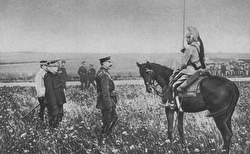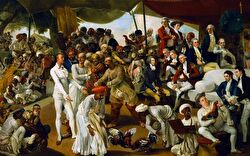
Written by Andrew Duncan
Jeremy Paxman arrives at a fashionable London restaurant slightly agitated because he’s seven minutes late. “I’m obsessed by punctuality, but it’s one of those mornings.” We each have a glass of champagne. “My dear fellow, lovely to see you. How old are you? [He’s 63 – I’m older.] I admire you for keeping at it, but ours is a wonderful trade. Where else can you turn up uninvited and meet people? One sounds like a frightful old fart, but we really have had the best of it. Some newspapers only appear to survive with work experience, and there’s no longevity, but it’s such bloody good fun. Of course, people are rightly wary about being interviewed. What’s the point of putting yourself up there to be mauled post facto by someone who only wants to describe knick-knacks? I’m amazed anyone is ever interviewed. Good health.”
So why is he subjecting himself to it? “Because I said I would.”
There’ll be lots of jocularity, mock insults (maybe not so mock), scorn, conviviality, and a sense he’s often on the verge of saying something mischievous only to stop just in time. His voice is surprisingly soft, sometimes difficult to hear above the hubbub. He’s made it a condition he won’t talk about personal matters, and even trivial details of his nearly 30-year relationship with TV producer Elizabeth Clough and their three children, who live in Stonor, Oxfordshire, are off the record. Some reports say he’s married; others use, correctly, the dread word “partner”.
He orders fish and chips [“my usual here”] and flirts with the foreign waitress over her pronunciation of halibut. “I want to hear you say it again. So sensuous.”
In an attempt to soften him up, I mention I’ve read Great Britain’s Great War, his book accompanying the BBC1 series [“You deserve a medal”] and think I found an error. “Damn, damn, damn. The only thing I really care about is facts. God, I hope you’re wrong.” He notes it in a diary.
At times it seems inappropriate to discuss disgusting deprivations of war over an expensive lunch. “Can you imagine living in a trench in this weather? Crikey. Soldiers rouged their cheeks so they didn’t look white with terror. It’s such an imaginative leap from our cosseted, indulged lives to something other than the achievement of personal pleasure. That’s really why people find it so hard to come to terms with the war.
“It has been mediated through historians and politicians when the important, hard thing now is to try to understand what it was like for ordinary people, any one of us here, or out on the street. I’m annoyed so many assumptions are made – the notion that generals set out to lose battles makes me very cross – and I wanted to present it as far as possible as it was seen by people at the time. Thousands of books are written. I wanted to return to the ‘felt’ experience.
“The war was a disaster, but much more complicated and nuanced than the simple-minded, ignorant, post-1960s prism suggests. The message is always the same – what pointless sacrifice. We don’t need the right-on prejudices of a generation far removed from what happened. My great-uncle Charlie [who died aged 24 at Gallipoli in August 1915] – I bet he’d never left his county; you have to get into the minds of these people. It ill behoves those of us accustomed to going abroad for pleasure and living our lives for self-fulfilment to imagine how and why these people responded.”
He’s critical of teachers who use “the Blackadder caricature” – Stephen Fry’s simpering General Melchett saying he’ll be “right behind” when Blackadder goes over the top, and Blackadder muttering, “Yes, 35 miles behind.”
“It’s a brilliant comedy, which I enjoy, but the problem comes when it’s taught as fact.” It is true, though, that some generals were bone-headed and sat in chateaux behind the lines, swigging brandy, while gung-ho former public-schoolboy subalterns led their men into suicidal charges. “Generals [78 of whom died on the British side] were often far from the action, but it would have been worse if they were closer. There were no personal radios, and telephone lines had to be buried, so they received messages and tried to build a composite picture.” He notes that the life expectancy of an officer was six weeks and they were five times as likely to be killed as the Tommies they led.
“When armchair generals glibly criticise them for continuing to mount attacks on enemy trenches, we have to ask, ‘Why did they continue?’ They did so because no one knew of any alternative. If it was so demonstrably false and incompetently executed, why didn’t the British Army mutiny, like others? It wasn’t the war to end all wars, more’s the pity, and it didn’t achieve ‘homes for heroes’ or ‘jobs for everyone’, but it caused enormous changes in women’s franchise, welfare, housing, whether or not they were intended. It made modern Britain, was genuinely a time when we were all in it together, and put an end to the assumption that everyone knew his or her place.”
He compares the séances that became popular during and after the war, as relatives tried to reach those killed, with the “dream” we’re living today. “When we strut the world stage, it’s partly because we’re conjuring up a relationship with the past that no longer exists. It’s present in current decision-making about Iraq, or Syria.” He presumably has a view on those conflicts. “Yes.” What is it? “Mind your own business.”
He appeared to row with PM David Cameron, who compared commemoration of the war with the Diamond Jubilee, with Paxman suggesting that “only a complete idiot would celebrate such a calamity”.
He now says, “Perhaps I expressed myself clumsily. I don’t think Cameron intended a celebration, but it was picked up by the press and presented unfairly.
“I’m still not sure how we’re going to pull off an act of remembrance. There’s no call for triumphalism, nor for maudlin nostalgia. I’m anxious about media overkill – ‘Good evening from Sarajevo’ on the six o’clock news. I admire the attempt to make it relevant, but basic issues can’t be ignored, and the key one is: why did people keep faith when it didn’t seem to be getting anywhere? We should respect such sacrifice.”
Cameron also allegedly claimed, vis-à-vis an interview with Paxman, that if he wanted to be shouted at by “an overpaid prima donna”, he’d join a Premier League football club. “I’m not sure he said that, but there we are. It’s a rough old game and you have to put up with that sort of stuff. You can’t care about it.” Last November, Nick Clegg joined the general harrumphing about vast BBC salaries by complaining that Paxman made “a million or thereabouts from the taxpayer for sneering at politics”.
Is he paid excessively? “How much do I earn?” he asks. We go off the record. He won’t dignify it with a discussion, but implies it’s much less than reported.
It’s said he suffers from depression – no point in asking, because that would result in an abrasive and justifiable put-down. But he sometimes wonders what the country has come to – particularly when he can make headline news by growing and then shaving off a beard. “I was naive and reckoned without the summer silly season. When that nonsense happened, I was damned if I’d dance to it. It was absurd, but funny.
“News is not easily predicted and a certain amount of time has to be filled. I’d often like to see the presenter say, ‘Not much happened today, so I’d go to bed if I were you.’
I’ve often felt like that on Newsnight. I wouldn’t do it, because it’s disloyal to colleagues who have slaved long and hard to make bricks without straw. That’s the nature of journalism.”
Although he denies he’s in showbiz, maybe he thinks he should do something more “important”. “Everyone has moments like that. It’s interesting how being an author seems more significant than being a journalist. It’s rubbish, of course. I enjoy writing books, but not every day. It’s intense, like working in the salt mines. Sometimes the words won’t come; at others, it’s what I imagine surfing to be like – wonderful and exhilarating. One loves the telling details you can put into books.”
In the TV series, he discusses the pioneering work of plastic surgeon Harold Gillies repairing the often obscenely damaged faces of injured men, but there’s no room to mention the poignant detail that mirrors were banned from the wards. “We show photographs on television, some hard to look at, so the point is made. There’s a lot in the book that didn’t make it into the series, including a sequence on the burial of the Unknown Soldier in Westminster Abbey. TV is a medium of impression as opposed to harsh, narrative fact.”
Newsnight, which he’s presented since 1989, was criticised for its aborted investigation into the late Jimmy Savile and false accusations against Lord McAlpine. “I nearly did resign,” he says. “But it’s staffed by young people who work very hard in spite of resources being cut and cut. I love them like a family. Any programme is bigger than an individual – which is why I don’t believe in presenter-editors. They become monsters. I thought it was my duty to stay and do what little I could to steady the ship. I don’t regret it.”
Recently, though, there have been accusations of “dumbing down”, with Kirsty Wark dancing to Michael Jackson’s Thriller at Halloween, Russell Brand pontificating to an apparently bemused Paxman about “paradigms” and democracy. The programme was described in the Daily Mail as a “pantomime”. He laughs. “Do you honestly think I’m going to react to tripe like that? Do better.” I’ll try, I promise.
He writes a lot about the Daily Mail in his book – “the most important paper in the First World War” – but avers that its then proprietor, Lord Northcliffe, went mad. “All proprietors do,” he adds languidly. “Tell me one who hasn’t?”
How about Rupert Murdoch, whose father, Keith, “provided a valiant service” at Gallipoli by getting a message about the disastrous campaign to Lloyd George? “My dear fellow,” he laughs. “I can see you digging a hole for me. Watch it.”
We discuss Brand. “He’s not full of rubbish. His diagnosis of disenchantment with politicians is spot on, but his prescription won’t work. There’ll be a government whether or not you vote, so why absent yourself? If you don’t take part, you’d better belt up and not grumble. Of course there are a lot of charlatans in politics, as well as noble people. At one end is rampant egotism, and at the other those who desire to make the world a better place. It’s up to voters to make a judgement.
“There should be a place on the ballot paper for ‘None of the above’, and if enough people filled that in, the system might start to change. But we’re stuck with what we have and I can’t think of a better one, although I find the whole green-bench pantomime at Westminster a bit silly. You and I don’t have to stand on our hind legs and make speeches. We can have a civilised discussion.”
Considering he campaigned as a Communist in school elections, was briefly a member of the Labour Club at St Catharine’s College, Cambridge, and applied for editorship of the left-wing New Statesman in his 20s, I wonder if he contemplated a career in politics. “Oh, God, do we have to have this stuff dragged up from 1978 or wherever? What an odd cove you are.” Maybe, I say, but it’s a reasonable question. “I did think of it,” he admits, “and I’m bloody glad some people want to. But I have no desire to tell anyone what to do with their lives. I want to provide opportunities and protect those I love.”
For years he’s been accused of being rude, arrogant, and patronising, none of which he seems to be in person. Perhaps a more trenchant comment is that he’s bored, becoming almost a caricature of himself. “Look, I can’t help my face. It’s long [like a horse, he suggests], and I can do nothing about it. Let’s be frank, some days are more interesting than others. That’s the nature of the news and any responsible, mature person would recognise it. You are very immature, even for your advanced years.” He laughs and we return, with some relief, to the war.
He becomes emotional in the series, particularly reading a letter home from a Scottish miner, Private John Scolles. “It’s only one of thousands, but they are immensely distressing. They contain instructions only to be opened in the event of death. None of us has had to do that, and I still find it moving.
“I love this country and very often we don’t know how lucky we are. Others attest to it – by the vast number of immigrants. Of all institutions, the one that’s suffered the least catastrophic decline is the armed forces.
It still enjoys a high degree of public regard, and it must be an awe-inspiring responsibility, and weigh heavily on their consciences, for politicians, most of whom have no military experience, to put young men and women in harm’s way.”
He describes in the book a soldier who asks his superior, ‘Permission to shoot the prisoner, sir?’ It echoes the case of Royal Marine Sergeant Alexander Blackman, who last December was sentenced to life for killing a wounded Taliban insurgent in 2011. “It’s not attractive seeing people who have never been in extremis passing judgement on others who have. Who knows how we’d behave? Imagine seeing your best friend blown to pieces, unable even to retrieve the body for burial. You might have heard him dying, eaten by rats. None of us has had to live through this, and we should respect those who have.
“I’d have done better for having time in uniform. The more we see of other members of our society, we realise we’re all human beings with the same hopes and fears. I’m not arguing in favour of national service, but I feel in awe of my parents’ generation who had to do that, and a bit guilty having such a privileged life. We’ve had it pretty easy and never been tested.
“Obviously I’m not wishing war on anyone, but it might have been better for all of us if we’d been obliged to do something rather than choosing for ourselves. It’s difficult to comprehend today a society where people were expected to do things other than gratify themselves.”
Let’s not forget.
Courtesy of The Radio Times. Written by Andrew Duncan. Original article here.


